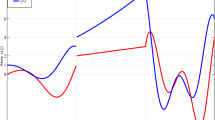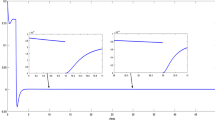Abstract
Many phenomena in inter-disciplinary fields can be explained naturally by coordinated behavior of agents with fractional-order dynamics. Under the assumption that the interconnection topology of all agents has a spanning tree, the consensuses of linear and nonlinear fractional-order multi-agent systems with input time delay are studied, respectively. Based on the properties of Mittag-Leffler function, matrix theory, stability theory of fractional-order differential equations, some sufficient conditions on consensus are derived by using the technique of inequality, which shows that the consensus can be achieved for any bounded input time delay. Finally, two numerical examples are given to illustrate the effectiveness of the theoretical results.
Similar content being viewed by others
References
A. Aghajani Y. Jalilian J. Trujillo, On the existence of solutions of fractional integro-differential equations. Fract. Calc. Appl. Anal. 15 No 1 (2012), 44–69 DOI: 10.2478/s13540-012-0005-4https://www.degruyter.com/view/j/fca.2012.15.issue-1/issue-files/fca.2012.15.issue-1.xml
J. Bai G. Wen A. Rahmani Y. Yu, Distributed formation control of fractional-order multi-agent systems with absolute damping and communication delay. Int. J. Syst. Sci. 46 No 13 (2015), 2380–2392
V. Borkar P. Varaiya, Asymptotic agreement in distributed estimation. IEEE Trans. Automat. Contr. 27 No 3 (1982), 650–655
Y. Cao Y. Li W. Ren Y. Chen, Distributed coordination algorithms for multiple fractional-order systems. Proc. of the 47th IEEE Conference on Decision and Control Cancun Mexico (2008), 2920–2925
Y. Cao W. Ren, Distributed coordination of fractional-order systems with extensions to directed dynamic networks and absolute/relative damping. Joint 48th IEEE Conf. on Decision and Control and 28th Chinese Control Conference Shanghai (2009), 7125–7130
Y. Cao Y. Li W. Ren Y. Chen, Distributed coordination of networked fractional-order systems. IEEE Trans. on Systems, Man, and Cybern., Part B: Cybernetics. 40 No 2 (2010), 362–370
Y. Cao W. Ren, Distributed coordination for fractional-order systems: dynamic interaction and absolute/relative damping. Syst. Contr. Lett. 43 No 3-4 (2010), 233–240
L. Chen Y. Chai R. Wu J. Yang, Stability and stabilization of a class of nonlinear fractional-order systems with Caputo derivative. IEEE Trans. Circ. and Syst.-II: Express Briefs. 59 No 9 (2012), 602–606
M. De la Sen, About robust stability of Caputo linear fractional dynamic systems with time delays through fixed point theory. Fixed Point Theory and Appl. 2011 (2011) Article # 867932 DOI:10.1155/2011/867932
M. DeGroot, Reaching a consensus. J. Amer. Stat. Assoc. 69 No 345 (1974), 118–121
W. Deng C. Li J. Lu¨, Stability analysis of linear fractional differential system with multiple time dealys. Nonlin. Dyn. 48 No 4 (2007), 409–416
R. Hilfer, Applications of Fractional Calculus in PhysicsWord Scientific Singapore (2000
A. Kilbas H. Srivastava J. Trujillo, Theory and Applications of Fractional Differential EquationsElsevier The Netherlands (2006
W. Li T. Li L. Xie J. Zhang, Necessary and sufficient conditions for bounded distributed mean square tracking of multi-agent systems with noises. Int. J. Robust Nonlin. Contr. 26 No 4 (2016), 631–645
J. Liang Z. Liu X. Wang, Solvability for a couple system of nonlinear fractional differential equations in a Banach space. Fract. Calc. Appl. Anal. 16 No 1 (2013), 51–63 DOI:10.2478/s13540-013-0004-0https://www.degruyter.com/view/j/fca.2013.16.issue-1/issue-files/fca.2013.16.issue-1.xml
Y. Lin K. Oh H. Ahn, Stability and stabilization of fractional-order linear systems subject to input saturation. IEEE Trans. Automat. Contr. 58 No 4 (2013), 1062–1067
C. Liu Y. Tian, Consensus of multi-agent system with diverse communication delays. Proc. of the 26th Chinese Control Conference, Hunan (2007), 726–730
J. Lu Y. Chen, Stability and stabilization of fractional-order linear systems worh convex polytopic uncertainties. Fract. Calc. Appl. Anal. 16 No 1 (2013), 142–157 DOI:10.2478/s13540-013-0010-2https://www.degruyter.com/view/j/fca.2013.16.issue-1/issue-files/fca.2013.16.issue-1.xml
R. Olfati-Saber R. Murray, Consensus problems in networks of agents with switching topology and time-delays. IEEE Trans. Automat. Contr. 49 No 9 (2004), 1520–1533
I. Podlubny, Fractional Differential EquationsAcademic Press New York (1999
W. Ren Y. Cao, Distributed Coordination of Multi-agent Networks: Emergent Problems, Models, and IssuesSpringer-Verlag London (2011
J. Shen J. Cao, Necessary and sufficient conditions for consensus of delayed fractional-order systems. Asian J. of Contr. 14 No 6 (2012), 1690–1697
J. Shen J. Cao J. Lu, Consensus of fractional-order systems with non-uniform input and communication delays. Proc. Institution of Mechanical Engineers, Part I: Journal of Systems and Control Engineering. 226 No 2 (2012), 271–283
Y. Tang H. Gao W. Zhang J. Kurths, Leader-following consensus of a class of stochastic delayed multi-agent systems with partial mixed impulses. Automatica. 53 (2015), 346–354
J. Tsitsiklis D. Bertsekas M. Athans, Distributed asynchronous deterministic and stochastic gradient optimization algorithms. IEEE Trans. Automat. Contr. 31 No 9 (1986), 803–812
T. Vicsek A. Cziro´k E. Jacob I. Cohen O. Shochet, Novel type of phase transitions in a system of self-driven particles. Phys. Rev. Lett. 75 No 6 (1995), 1226–1229
Y. Wan G. Wen J. Cao W. Yu, Distributed node-to-node consensus of multi-agent systems with stochastic sampling. Int. J. Robust Nonlin. Contr. 26 No 1 (2016), 110–124
H. Yang L. Guo X. Zhu K. Cao H. Zou, Consensus of compound-order multi-agent systems with communication delays. Cent. Eur. J. Phys. 11 No 6 (2013), 806–812
H. Yang X. Zhu K. Cao, Distributed coordination of fractional order multi-agent systems with communicaiton delay. Fract. Calc. Appl. Anal. 17 No 1 (2014), 23–37 DOI:10.2478/s13540-014-0153-9https://www.degruyter.com/view/j/fca.2014.17.issue-1/issue-files/fca.2014.17.issue-1.xml
H. Ye J. Gao Y. Ding, A generalized Gronwall inequality and its application to a fractional differential equation. J. Math. Anal. Appl. 328 No 2 (2007), 1075–1081
X. Yin D. Yue S. Hu, Consensus of fractional-order heterogeneous multi-agent systems. IET Contr. Theory Appl. 7 No 2 (2013), 314–322
Z. Yu H. Jiang C. Hu, Leader-following consensus of fractional-order multi-agent systems under fixed topology. Neurocomputing. 149 No B (2015), 613–620
X. Zhang L. Liu G. Feng, Leader-follower consensus of time-varying nonlinear multi-agent systems. Automatica. 52 (2015), 8–14
W. Zhu Z. Jiang, Event-based leader-following consensus of multi-agent systems with input time delay. IEEE Trans. Automat. Contr. 60 No 5 (2015), 1362–1367
Author information
Authors and Affiliations
Corresponding author
About this article
Cite this article
Zhu, W., Chen, B. & Yang, J. Consensus of Fractional-Order Multi-Agent Systems with Input Time Delay. FCAA 20, 52–70 (2017). https://doi.org/10.1515/fca-2017-0003
Received:
Revised:
Published:
Issue Date:
DOI: https://doi.org/10.1515/fca-2017-0003




